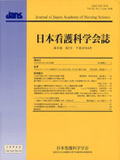Japanese
English
- 販売していません
- Abstract 文献概要
- 参考文献 Reference
- サイト内被引用 Cited by
要旨
本研究の目的は,進行性筋ジストロフィー症(以下,筋ジストロフィー症)の子どもの意思や欲求に,看護師がどのように気づき関わっているかを明らかにすることである.研究方法はLeiningerの民族看護学を用いた.研究参加者は,主要情報提供者が看護師8名,一般情報提供者が筋ジストロフィー症の子ども4名を含む,看護師や家族,養護学校教員や医師等16名だった.
分析結果から,5つのテーマと1つの大テーマが抽出された.
大テーマ:看護師は,だんだん動けなくなっていく子どもの苛立ちに気づくと辛くなるが,子どものサインに気づき関わろうとしている.
筋ジストロフィー症の子どもに関わるに看護師とって,子どものまなざしやかすかな声,苛立ちに気づいたとき,子どもに近づいて声をかけ確かめることの重要性が示唆された.
Abstract
To understand nurses'perception of the wishes and feelings of children with progressive muscular dystrophy, the Leininger ethnonursing method was used. The participants in the study were eight nurses as key informants and sixteen general informants, who consisted of nurses, family members, a teacher at school for handicapped children, a physician and four children with muscular dystrophy.
The major theme was that although it was painful for nurses to be aware of children's frustration over loss of movement, nurses should notice the children's signs and become involved. The results indicate that it is important for nurses to approach and listen carefully to children when they notice any irritation in the children if the nurses are concerned about the children's expressions or voices.
Copyright © 2006, Japan Academy of Nursing Science. All rights reserved.


